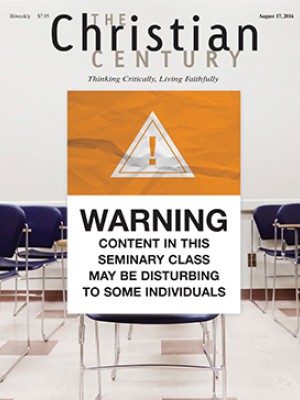Ordinary 23C (Luke 14:25-33)
For years I have celebrated Toni Morrison’s refusal to predicate her fiction upon the white gaze. She unapologetically places black people at the center, with little regard for the entreaties of the presumed white reader who expects otherwise of a great American author. I have tried my best to emulate Morrison’s defiance in my own work.
Right now, however, I want to talk to you—a Century reader and likely a white person. I want you to know that we live in different worlds. There’s a good chance your church is a white church, driven by the history of white people. And if you’re white, when you leave your church you enter a world made for you—a world that assumes your house is the best on the block and that all sensible people should seek to dwell therein.
Read our latest issue or browse back issues.
During divinity school, I interned at a prosperous suburban church. I grew very close to the pastor, his family, and the congregation. I experienced the utter pain and the true joy that lurks beneath cultural representations of white, upper-middle-class life. I also discovered that my politics and theology were vastly different from theirs. We inhabited different worlds.
I attended a sporting event with the pastor and his family. His wife had shown me marvelous hospitality. I ate at her table, babysat her children. I will never forget the moment at the game when she looked over at me and asked me a question, one motivated by sincere concern yet funded by whiteness. “Bill,” she asked, “can the AME Church use your gifts?”
In other words: you’re smart, and you code-switch masterfully. Why would you do ministry in a black denomination? The implication was that the African Methodist Episcopal Church was lacking something and that I was exceptional, not quite like the rest of them. I was destined for better—read, whiter—things.
She knew only one thing about our denomination. And she was wrong to intimate that I am exceptional. The AME Church is the church of Richard Allen, Flora Allen, Sarah Allen, Jarena Lee, Daniel Alexander Payne, Henry McNeal Turner, Reverdy Cassius Ransom, Ida Bell Wells-Barnett, Richard Robert Wright, and Rosa Parks. I am the proud progeny of ecclesiastical ancestors who made bricks without straw, who fought white Methodists hell-bent on taking their property and subjugating their authority. They built colleges, seminaries, publishing houses, and churches. They founded literary and historical societies. They worked within and without the American system to make a new world for their children. I am committed to the church they bequeathed to us. I have no desire to live in another house.
In this week’s Gospel text, a thick throng is following Jesus. We do not know what conversations are taking place in this group, a group enamored with Jesus for reasons both substantive and fleeting. Maybe the journey is punctuated by the silence that often seizes us when we are in the presence of people possessed of notoriety or infamy. We don’t know.
We do know that when Jesus speaks, he tells them, “Whoever comes to me and does not hate father and mother, wife and children, brothers and sisters, yes, even life itself, cannot be my disciple.” They must be stunned by the challenge. The word translated as hate does not mean anger or hostility. The implication is rather that when conflicts arise as a result of discipleship—and arise they will—discipleship must be chosen over all human relationships. The choice is a hard pill to swallow, but at least with Jesus there is truth in advertising. There is no bait and switch. The cross and conflict, internal and external, are nonnegotiables on this journey.
Verses 25–27, with their piercing hyperbole, normally receive top billing homiletically. However, I am struck by Jesus’ words regarding building a tower. The construction metaphor is fascinating. Discipleship entails building. It raises the question, “Do we have the labor, capital, and desire to build this new community under the aegis of God’s Spirit?”
In the American context, there is some demolition work required if the tower is to be constructed upon a firm foundation. The text suggests that discipleship is inseparable from renunciation. Renunciation is necessary if the gospel of Jesus Christ is to be the theo-political logic upon which life is based.
Black Christians are well practiced in cultural renunciation. My ancestors rejected the notion of America as “a shining city on a hill.” For them and for many still today, that city’s lights of justice and peace are so dim as to be inconsequential. White Christians have not been similarly compelled to renounce the power and principality of white supremacy or American empire.
This Gospel text should be understood in the context of the imperial powers of its day, powers that demanded ultimate allegiance. Those powers demand much the same of us. Does coming to Jesus mean hating the eternal war on terror? The plutocratic, pay-to-play reality of our politics? Our nation’s perpetual failure to remember its own history? Whatever direction this extraordinary text points, it is surely away from the cultural and ecclesiastical status quo.
Willie Jennings argues that discipleship in America is truncated by “racial faith.” He writes that “overturning racial faith will require a group of people who reject imperialism, not only the imperialism of a nation but the imperialism of Christianity, of whiteness, of a way of life that imagines that we are first and always teachers rather than being first and always learners. These people will open themselves to being changed.”
Is this cost too high a price to pay for discipleship to take root upon these shores?






